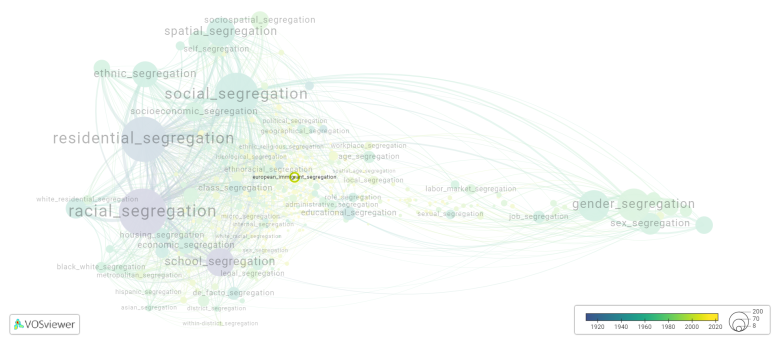European immigrant segregation: Difference between revisions
(Creating page) |
(Creating page) |
||
| (8 intermediate revisions by the same user not shown) | |||
| Line 1: | Line 1: | ||
===== Date and country of first publication<ref>Date and country of first publication as informed by the Scopus database (December 2023).</ref>===== | ===== Date and country of first publication<ref>Date and country of first publication as informed by the Scopus database (December 2023).</ref>===== | ||
2011<br> | 2011<br> | ||
United Staes | |||
===== Definition ===== | ===== Definition ===== | ||
| Line 12: | Line 12: | ||
Efforts to reduce European immigrant segregation may include policies to promote diversity and inclusion, initiatives to improve access to education and employment opportunities, and programs to facilitate integration and foster intercultural understanding. By promoting greater interaction and integration between European immigrants and the larger society, it is possible to address the challenges posed by immigrant segregation and create a more cohesive and inclusive society. | Efforts to reduce European immigrant segregation may include policies to promote diversity and inclusion, initiatives to improve access to education and employment opportunities, and programs to facilitate integration and foster intercultural understanding. By promoting greater interaction and integration between European immigrants and the larger society, it is possible to address the challenges posed by immigrant segregation and create a more cohesive and inclusive society. | ||
==See also== | ==See also== | ||
==Related segregation forms== | |||
European immigrant segregation is frequently discussed in the literature with the following segregation forms: | |||
[[residential segregation]], [[social segregation]] | |||
[[File:european_immigrant_segregation.png|780x780px]] | |||
This visualization is based on the study [[Segregation_Wiki:About| The Multidisciplinary Landscape of Segregation Research]]. | |||
For the complete network of interrelated segregation forms, please refer to: | |||
* [https://tinyurl.com/2235lkhw First year of publication] | |||
* [https://tinyurl.com/2d8wg5n3 Louvain clusters] | |||
* [https://tinyurl.com/223udk5r Betweenness centrality] | |||
* [https://tinyurl.com/244d8unz Disciplines in which segregation forms first emerged (Scopus database).] | |||
==References== | ==References== | ||
==Notes== | ==Notes== | ||
<references /> | <references /> | ||
{{NoteAI}} | {{NoteAI}} | ||
==European | ==European immigrant segregation appears in the following literature== | ||
Verdugo G. (2011). Public housing and residential segregation of immigrants in France, 1968 1999. ''Population'', ''66''(1), 169-193. https://doi.org/10.3917/pope.1101.0169 | Verdugo G. (2011). Public housing and residential segregation of immigrants in France, 1968 1999. ''Population'', ''66''(1), 169-193. https://doi.org/10.3917/pope.1101.0169 | ||
Latest revision as of 07:17, 16 October 2024
Date and country of first publication[1][edit | edit source]
2011
United Staes
Definition[edit | edit source]
European immigrant segregation refers to the phenomenon of European immigrants clustering in certain neighborhoods or communities within a new country rather than dispersing throughout the population. This segregation can occur for a variety of reasons, including language barriers, cultural differences, economic disparities, and a desire to maintain connections with their home country.
In some cases, European immigrants may self-segregate as a way to preserve their cultural identity and traditions. They may feel more comfortable living amongst others who share their background and can provide support in navigating life in a new country.
However, European immigrant segregation can also lead to social issues such as isolation, limited access to resources and opportunities, and the perpetuation of stereotypes and prejudices. It can create barriers for integration and assimilation into the new society, hindering the overall social cohesion.
Efforts to reduce European immigrant segregation may include policies to promote diversity and inclusion, initiatives to improve access to education and employment opportunities, and programs to facilitate integration and foster intercultural understanding. By promoting greater interaction and integration between European immigrants and the larger society, it is possible to address the challenges posed by immigrant segregation and create a more cohesive and inclusive society.
See also[edit | edit source]
Related segregation forms[edit | edit source]
European immigrant segregation is frequently discussed in the literature with the following segregation forms:
residential segregation, social segregation

This visualization is based on the study The Multidisciplinary Landscape of Segregation Research.
For the complete network of interrelated segregation forms, please refer to:
References[edit | edit source]
Notes[edit | edit source]
- ↑ Date and country of first publication as informed by the Scopus database (December 2023).
At its current state, this definition has been generated by a Large Language Model (LLM) so far without review by an independent researcher or a member of the curating team of segregation experts that keep the Segregation Wiki online. While we strive for accuracy, we cannot guarantee its reliability, completeness and timeliness. Please use this content with caution and verify information as needed. Also, feel free to improve on the definition as you see fit, including the use of references and other informational resources. We value your input in enhancing the quality and accuracy of the definitions of segregation forms collectively offered in the Segregation Wiki ©.
European immigrant segregation appears in the following literature[edit | edit source]
Verdugo G. (2011). Public housing and residential segregation of immigrants in France, 1968 1999. Population, 66(1), 169-193. https://doi.org/10.3917/pope.1101.0169
